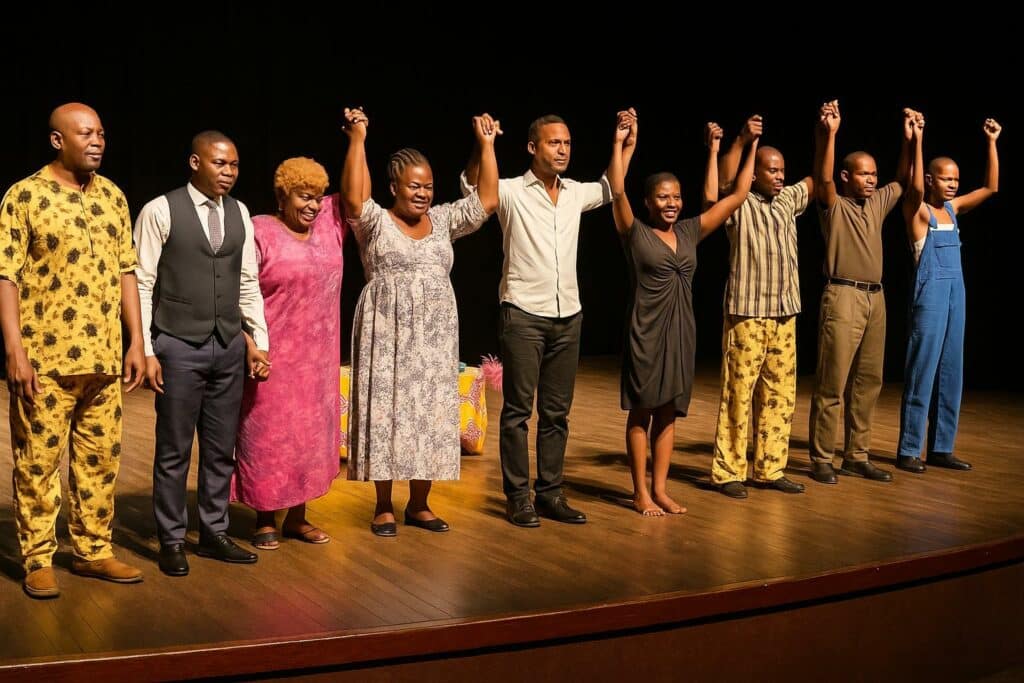A commemorative festival bridging generations
From 28 to 31 October 2025 the shaded courtyards of the Institut français du Congo in Brazzaville resonated with poetry, stage lights and the discreet crackle of archive film. Thirty years after the passing of novelist, journalist and cultural agitator Sylvain Ntari Bemba, the festival theme – “What has become of the Congolese phratrie?” – set the tone for a gathering focused less on nostalgia than on transmission. In Congolese usage the term “phratrie” evokes the fraternal circles that have historically sustained the nation’s writers when formal structures proved fragile. By reviving the concept, organisers wished to draw a line from the pioneers of the 1950s to the digital-native storytellers seated in the front rows.
A canon revisited through stage and word
Each evening’s programme was conceived as a living anthology. The Mbongui Théâtre of Jean-Louis Ouakabaka opened the festival and later closed it with a charged rendition of Sony Labou Tansi’s “Antoine m’a vendu son destin”, its polyphonic chorus carried by percussion that blended village rhythms with jazz. Earlier, the troupe Maloba revisited Bemba’s “La valse interrompue”, while the Théâtre des Trois Francs adapted Emmanuel Boundzeki Dongala’s realist micro-novella “Une journée dans la vie”. Between performances, audiences discovered handwritten drafts by Henri Lopès and Sony Labou Tansi, painstakingly conserved by the Marlborough archives, projected in high definition so that every correction, every exclamation mark spoke of an authorial struggle.
Debates mapping the literary lineage
Two round-tables provided the scholarly backbone. Professor Mukala Kadima Nzuji and Professor André-Patient Bokiba traced the emergence of the modern Congolese voice through the review Liaison, describing how its pages allowed Jean Malonga, Tchicaya U’Tam’si and Jean-Pierre Makouta-Mboukou to circumvent colonial censorship and sculpt a vernacular poetics. A second panel, convened by the association Nouvel Art, examined the evolution of Congolese theatre from village ceremonial to contemporary spoken-word. Playwright Matondo Kubu Ture underlined the enduring influence of ritual, while stage director Nicolas Bissi stressed the need for dramaturgy to incorporate the rapid urbanisation of Pointe-Noire and Brazzaville. The discussion concluded that the canon is neither closed nor monolithic but a living reservoir capable of absorbing rap, street dance and even video games as narrative devices.
Youth engagement and the call to read
As guest of honour, chemist-novelist Emmanuel Dongala spent long hours in informal “cafés écrivains” dissecting passages of “Johnny Mad Dog” with pupils from the lycée Chaminade and the university club Quatrième Dimension. “Reading is an act of fraternity and of self-respect”, he told them, urging perseverance amid the distractions of social networks. Spontaneous slam sessions followed, including “Lettre à José Pivin” and “Tu n’as pas besoin de paix, j’ai besoin de justice”, whose raw cadences struck a chord with an audience largely under twenty-five. For many participants the encounter constituted a first direct contact with writers whose names decorate classroom walls.
Institutional support and cultural diplomacy
Initiator Patrice Yengo, sociologist and publisher, applauded the commitment of the Institut français du Congo, the event’s sole formal partner. While noting that broader institutional backing would have eased logistics, he praised the Ministry of Culture’s facilitation of travel permits for interior-based troupes, a reminder that public authorities remain attentive to the sector. Observers from the Central African Economic and Monetary Community used the occasion to explore possible mobility funds for artists, signalling that literature is increasingly considered a vector of regional soft power. By hosting the festival, Brazzaville consolidated its reputation as a crossroads where francophone, lusophone and Kikongo influences converse without friction.
À retenir
Attendance data collected by the organisers indicate more than three thousand visitor entries across four days, half of them students. Book sales at the on-site pop-up shop, handled by local distributor Les Lettres du Fleuve, surpassed two hundred copies – modest figures in absolute terms yet significant in a market where the annual print-run rarely tops five hundred per title. Perhaps most revealing was the proliferation of hashtags such as #Phratrie2025, suggesting that the literary memory work performed on stage already circulates within the digital commons.
Le point culturel
Beyond celebration, the festival served as a barometer of the creative economy. Financing derived from a hybrid model mixing foreign cultural diplomacy, ticketing and micro-patronage via mobile-money platforms. The success highlights the potential for a formal fund for live-arts production, a proposal presently under review at the Congolese Agency for Cultural Industries. It also underscores the government’s stated objective, reiterated in the National Development Plan 2022-2026, of elevating cultural industries to five percent of GDP. In a context where diversification away from hydrocarbons remains strategic, nurturing literature and the performing arts provides both symbolic capital and skilled employment.

